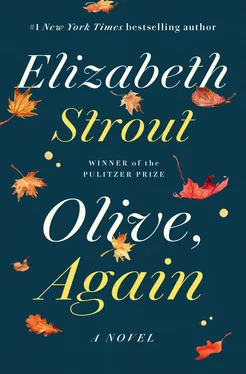Olive’s foot was bobbing up and down. “Ay-yuh,” she said. “Nothing to do about it at this point.”
Cindy hesitated, and then she asked, “Were things always bad with your son?”
Olive tilted her head as though thinking about this, and then she said, “I really don’t know. I don’t think so. Not for a while. Maybe things started with his first wife.”
After a minute, Cindy—who’d turned her gaze toward the window, and saw the grayness of the sleet that was splattering against it—said, “Well, I’m sure you didn’t scream and yell a lot like my mother did. She was difficult, Olive. But then, she had a difficult life.” She turned her face back to Olive.
And Olive said, “Oh, I think I did scream and yell a lot.”
Cindy opened her mouth, but Olive continued. “I can’t honestly remember, but I think I did. I was pretty awful when I felt like it. My son probably thinks I’m a difficult woman, like you think your mother was.”
“Well, I still loved her,” Cindy said.
“Yuh. And I suppose Christopher loves me.” Olive shook her head slowly. The two women were silent for a few minutes. Olive held the towel in her lap.
Then Olive leaned forward and said quietly, “I will tell you this, Cindy. There are times I miss Henry so much I feel that I can’t breathe.” She sat back, and Cindy thought there might be tears in her eyes. Olive blinked, then she finally said, “I miss him so much, Cindy, right out of the blue—and it’s not because Jack isn’t good to me, he is, mostly—but something will happen and I will think Henry .”
“I’m awfully glad you came over,” Cindy said. “You wouldn’t believe the people who don’t come over to see me.”
“Yes, I would. Believe it.”
“But why don’t they come see me? I mean, Olive. Old friends don’t even come see me.”
“They’re scared.”
“Well, too bad!”
“Oh, I agree. I agree with you about that.”
“But you’re not scared.”
“Nope.”
“Even though you’re scared of dying.”
“That’s right,” Olive said.
The weather remained nasty; the wind whistled through the windows and it rained and then snowed briefly and then rained again. To Cindy it seemed like this went on for days. In the mail during this time she received a card from the librarians she had worked with. It had a flower on it, and inside it said, Get Well Soon! And everyone had signed their names. Cindy threw it into the wastebasket. The nurse came and changed the bed, and Cindy was glad to see her; they spoke briefly and companionably. But when the nurse finally left, Cindy got back into bed and pulled the covers up almost over her head. She listened to Pandora on her phone, with her earplugs in, which was something she did more and more. There was no sense today that she could read a book; she did not want to read a book. And she did not want to watch any movie on the iPad that Tom had bought her for that purpose.
Then she took her phone and texted her sons, who were both at the university. One more to go, she wrote, I love you both!! And in a few minutes, they had both texted back, We love you too, Mom. Her older boy texted again and said, Good luck with the last one! And she wrote back, Thank you honey!, and sent him a kiss emoticon. She wanted to write more, to say, But I really really REALLY love you! But there was no point in that. There were so many things that could not be said, and this had occurred to Cindy with more frequency and it made her heart ache. But she was very tired, and in a way that helped her, for she gave herself over to it, listening to her music on her phone. When she dozed, she did not feel herself fall asleep, and so she was surprised when she woke up.
Toward the end of the day, Anita stopped by on her way home from work, and Cindy sat at the kitchen table with her. Anita’s husband—Tom’s brother—might be losing his job, and Cindy said, “Anita, you have a lot of stuff going on,” and Anita said, “I do. And so do you,” and then Anita laughed; she had a burble of a laugh, and she pushed her glasses up her nose, and Cindy put her hand over Anita’s. “And Maria with those tattoos,” Anita said. “Up and down each arm, and I told her, Well, you just wait till that arm gets flabby. And she said, I’m getting them on my butt too—” Tom came through the door then, and Cindy asked if Anita wanted to stay for supper, and Anita said, “God, I would love to stay for supper.” And she got up and put her coat on. “But I got to feed that freakin’ family of mine.”
—
The next day the sun came out. It shone brightly as Cindy walked across the driveway to the car with Tom, who had taken the morning off to go with her for her last treatment, and she noticed the sun but almost nothing else, and she didn’t say much to Tom as he drove her to the hospital. Once there she sat as she had before, for more than an hour while the stuff was dripped into her, then Tom helped her get back into the car and he said, “I’m going to stay right with you, Cindy. All day.” Back at the house, Cindy got into bed, and pretty soon Tom came up the stairs and sat on the bed next to her. He was eating an apple, and Cindy could not stand the sound of it. He crunched the apple, and there were slurping sounds too, and she finally said, “Tom, can you finish that apple somewhere else?” And he looked hurt, and said, “Okay,” and went back downstairs.
Exactly a week after Cindy’s final treatment, Olive Kitteridge showed up, and she said, “Congratulations. What’s next?”
“A scan in three months. So we wait.”
“Okay, then.” After a moment, Olive said, “Jack and I had a fight. Boy, it was a whopper.”
Cindy said, “Oh, Olive, I’m sorry to hear that.”
“Yuh, well, I’m sorry to report it. It had to do with our friends. Our social life, as Jack put it.”
Cindy lay back on her cushions and watched Olive. Her face seemed to be moving; she was distressed. “You want to tell me?” Cindy asked.
“Well, he has these friends from his former life, the Rutledges, and I said the other night after we’d had dinner with them, There’s nothing wrong with Marianne Rutledge that a pin wouldn’t fix.” Here Olive raised her hand, fingers together, and made a jabbing motion in the air. “So stuffed up on herself, that woman, honest to good God. And he took offense! He took offense, and then he said, Well, Olive, your friends are rather provincial. He said that. He said that they never asked him about himself—God, what a male thing to say!—and that he found them to be pro-vin-ci-al. And I told him what was provincial was the fact that he cared that his daughter is gay—that he should be ashamed about calling anyone provincial when he feels that way, I said it’s more than provincial, Mr. Harvard Smarty Pants, it puts you right back in the Dark Ages. I got so furious that I got into the car and drove, and do you know where I thought I was driving to? Home! I thought I was going to drive back to where I used to live with Henry, and it took me a few minutes to realize that that house isn’t even there anymore. So I drove out to the Point, and I sat in the car, and I bawled like a baby, and then I drove back to Jack’s house, well, our house, I suppose, and— Here’s the thing. He was waiting for me, and he felt terrible. He felt awful that he had said those things.
Читать дальше













